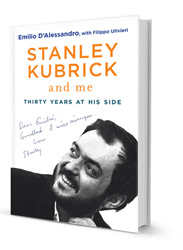EMILIO WILL PICK YOU UP AT THE STATION
In March 2005, I found an email in the inbox of ArchivioKubrick from Paolo Morrone, a dentist in Cassino who was “lucky enough to be a friend of Emilio D’Alessandro, the Italian who was Stanley Kubrick’s right-hand man for thirty years.” ArchivioKubrick is a website that I started in 1999 as an attempt to make available all the material I’d managed to collect about the films of Stanley Kubrick. Could Emilio D’Alessandro help with the site? That’s what Paolo was asking. Modesty makes it impossible for me to disturb famous people, because I’m convinced that the last thing they want is to be subjected to interviews. I replied to Paolo politely but rather vaguely, saying I’d heard of Mr. D’Alessandro in an English documentary, where he played a small part as the driver who went to pick up Kubrick’s collaborators at St. Albans Station. It is difficult for me now to recall what I was thinking of Emilio back then, but I must have had the feeling that there wouldn’t be much benefit for my site in that.
Paolo wasn’t discouraged at all by my reluctance, though. He persisted in writing me that it would be nice if I could meet Emilio and listen to what he had to say about Kubrick. By the end of July, it seemed rude to keep declining Paolo’s invitations, so I agreed to visit Emilio with a group of people from Pescara who wanted to organize a conference about Kubrick, with Emilio as guest of honor together with Christiane Kubrick and Jan Harlan.
The following Saturday, I went to Cassino, and Paolo took me to Emilio’s house in the countryside. A small, agile-looking man met us at the gate. He spread his arms wide to welcome us. It was such a spontaneous gesture that it made me smile. We shook hands, and they took me to the kitchen where Janette, Emilio’s wife, was preparing lunch. We started to talk, and I immediately felt comfortable there. Not long afterwards, the group from Pescara arrived and time flew. Emilio spoke enthusiastically, and everything he said involved Kubrick in such a real and tangible way that I had the extraordinary feeling of actually being near a person I’d admired for years from afar. It was a revelation, and by the end of the day, strange as it may seem, I found myself thinking of Kubrick as “Stanley.” As Paolo was turning the car around, I looked back and saw Emilio waving his arms again just as he had done when we arrived, but this time with one hand raised up in the air.
At the end of September, when Emilio was to be a guest on a Radio Tre program to promote the forthcoming conference in Pescara, Paolo contacted me again and insisted on taking me with him to the recording of the program. At the Rai (Italian Radio & TV) studios, I sat in the guest room with Janette. She was interested in my work as a researcher at the National Research Council of Italy and in my passion for Stanley’s films. When I told her that I’d been to London a couple of times, she insisted on continuing our conversation in English. So we talked about e-commerce, about Piccadilly Circus, and Italian and English cooking. On the other side of the glass, Emilio was telling the story about the cats in Andros’s Mini and Stanley’s unbridled enthusiasm for electronic gadgets and military vehicles.
A few days later, I received another call: Emilio wanted to write a book of his memoirs, and everybody had thought of me. Just like that. I must have babbled something about it being a good idea, not only to show Stanley in a different light from the one perpetuated by the press but also to give everyone a chance to enjoy the emotions that Emilio’s words were able to arouse, as I had experienced myself. “Let’s talk about it in more detail. Come next Saturday. Emilio will pick you up at the station.” Ah, right.
I spent the following days working on a structure for the book, jotting down ideas, suggestions, and questions I wanted Emilio to answer. It was as if I were preparing myself for a job interview, only when I got there I didn’t have a chance to propose anything because I found that it had all been decided beforehand. Emilio and Janette just nodded with knowing smiles and didn’t respond otherwise to anything I said. It was as if they already knew exactly what I was going to suggest. After a few minutes, I came to terms with the fact that there was no point trying to “sell” my project. What I had to do instead was get down to work. That same evening, in the pizzeria where we had dinner, I learned more: Janette spoke on their behalf and said that I should think of the book as a gift from her, Emilio, and Stanley. “You don’t have to tell us how you want to do it. Whatever you think is fine with us.”
On the way back, Emilio did most of the talking but never about the book. He preferred to ask me about my family, about my grandparents’ house in the mountains, and if I had any cats. I said I would have loved to have one, but in my place in Rome I didn’t have much space. My parents had tortoises in their garden, though. “Oh, I love tortoises!” said Janette. “I had one when I was a child!” After a fairly thorough conversation about tortoises, Emilio asked, rather nonchalantly, “So, will the book be ready by Easter?” It was October 10. Before I could answer, he added, “It has to come out at the same time all over the world.” “I think it might take a bit more time than that,” I admitted cautiously. “Oh, yes. It always takes longer than you expect,” Emilio remarked with a smile. Janette laughed.
I spent the next day with Emilio in his attic opening the trunks where he kept all the things from his life in England. Each of them revealed small treasures: the call sheets from the first day of shooting of Eyes Wide Shut, key rings from the Overlook Hotel, faded Polaroids of the set of Barry Lyndon, the insurance documents for the Mercedes with Emilio’s signature alongside those of the members of the Kubrick family, Christmas cards signed by Christiane, Kubrick’s (or rather Stanley’s) letters with details of how to manage the house, and the organization of the film being produced at the time. I was surprised by the way Emilio didn’t touch anything. He let me do the organizing and cataloguing. All he did was answer my questions when I couldn’t work out where a particular object came from. “It’s exactly the same as being with Andros,” he said after a while, “only you don’t swear.”
One weekend was not enough to make an inventory of everything. Not least because there was stuff all over the place: in the attic, in the garage, even in Emilio’s mother’s house. So our research went on after Christmas, after Easter, and after Easter of the following year. Janette interspersed all this with fine lunches, during which we nearly always ended up talking about cats and Emilio distractedly mentioned anecdotes that for me were worth an entire book in my Kubrick library. I needed time to get used to it – to learn to see Emilio and Stanley’s day-to-day way of life as normal. Emilio had realized this, and he enjoyed playing with my enthusiasm: “I’ve got a little surprise for you,” he said on more than one occasion when I arrived at the station, and then he showed me some piece of memorabilia in the garage that he had found who knows where – an LP of the Full Metal Jacket soundtrack signed by Kubrick, a bunch of keys from Childwickbury, a dusty photo of himself with a mustache in front of the model of the Overlook Hotel.
Sometimes the things he turned up had a profound effect on him. Once he called, his voice shaking with emotion, to tell me that he’d come across a note Stanley had written him after he’d decided to go back to Italy. It had been in one of the pockets of a “full metal jacket” for over ten years. “He wrote that he was really sad I was leaving . . . I’d forgotten about it, this note.”
It wasn’t easy to decide how much importance to give to each episode. If you asked, and I did want to ask, any random day spent with Kubrick would have been enough to fill a hundred pages. I wanted to convey the idea of the rhythm of those days spent with the director, but at the same time I wanted to remain faithful to Emilio’s image of Stanley, leaving mine to one side. For Emilio, Stanley wasn’t the genius who had produced some of the undisputed masterpieces of cinema; he was quite simply the best employer you could have, surrounded by the best team of assistants there was. It was both a training course and a school of life. At times, I was worried that I was being too intrusive, and I wondered whether investigating Kubrick’s private life was indiscreet. But it was enough to listen to Emilio to realize that he would provide me with facts and impressions, but never secrets.
I needed to understand Emilio before I could start writing his story, but it was difficult to define the real nature of his work, of his presence alongside the director. Emilio was the only person who stayed with him for such a long time, and more importantly, the one who stayed not because he was Kubrick but because he was Stanley. Emilio was beyond being a factotum who deals with and solves the tasks and problems of every day. Nor was he the stereotypical taxi driver-cum-confidant who wheedles thoughts, fears, and joys from whoever sits on the backseat. There isn’t a single word that encapsulates what Emilio did for Kubrick, or what his role was. Calling him an assistant, personal assistant, right-hand man, or one of the family leaves out something essential. Emilio was quite simply there when he was needed, and even when he wasn’t – ”because you never know.”
I often thought about Sara Maitland’s words in the documentary The Last Movie: “Stanley was absolutely unaware of the normal frustrations of middle-class-not-particularly-rich life – computers did not break down, why hadn’t I got it fixed, why didn’t I have a competent fixer, why hadn’t I sent for them already, why was my printer not working . . . ?” It’s true: Stanley knew absolutely nothing about these frustrations, but it wasn’t a question of class. It’s because all he had to do was call Emilio. The composer Nino Rota had summed up this epiphany better than anybody else while he was chatting with Emilio from the rear seat of the Mercedes on his way back from Abbots Mead: “I wish I’d been as lucky as Kubrick!”
“Filippo,” Emilio said once, in a succinct attempt to dispel my doubts, “just write the book the way Stanley would have made a film.” Did he want to reassure me or spur me on? I had to make quite an effort not to be terrified by that.
I found that it helped to focus on details that at first seemed unimportant: the radio that was fixed in an instant, the meetings between the two of them over a cup of coffee, the doors of major film companies that had always been closed but were now open, Stanley wanting Emilio around him for no apparent reason. I realized that these images were more meaningful than many of my ruminations. They might even be the answer. The garden in front of the cottage certainly was an answer. It was perfectly kept, and it was only the last in a long line. During the breaks from our interviews, which were not so much for a rest as because it was necessary to feed the hens, I gathered my thoughts in the shade of the portico and looked at the perfectly cut grass, the colorful flowers, and the careful compositions of nearly ripe fruit surrounded by buzzing insects. What else was there to understand? Emilio popped out of the henhouse with a smile and reached out a hand to show me a couple of eggs. And I smiled too.
Filippo Ulivieri
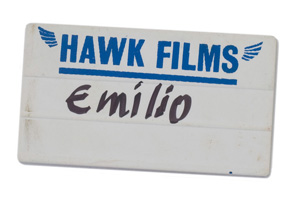
It was a revelation, and by the end of the day, I found myself thinking of Kubrick as “Stanley.”
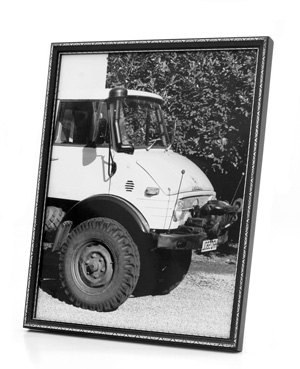
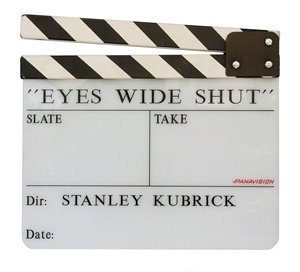
Emilio was the only person who stayed with him not because he was Kubrick but because he was Stanley.




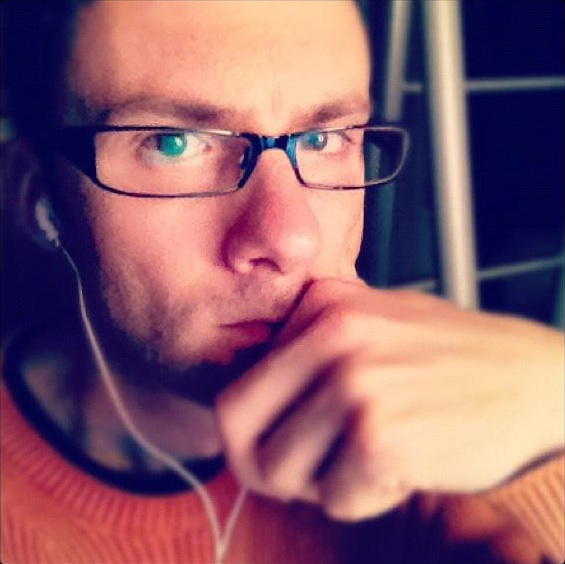 Born in 1977, Filippo Ulivieri is a writer and a teacher of film theory. He is the leading expert in Stanley Kubrick’s cinema in Italy with 15+ years of research on the subject: his features on the director’s career have appeared in several newspapers and magazines. Stanley Kubrick and Me has been published in Italy in 2012. He is co-scenarist of Alex Infascelli’s documentary S is for Stanley (2015).
Born in 1977, Filippo Ulivieri is a writer and a teacher of film theory. He is the leading expert in Stanley Kubrick’s cinema in Italy with 15+ years of research on the subject: his features on the director’s career have appeared in several newspapers and magazines. Stanley Kubrick and Me has been published in Italy in 2012. He is co-scenarist of Alex Infascelli’s documentary S is for Stanley (2015).
